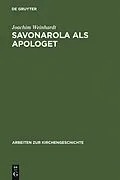Savonarola (1452-1498) saw it as his highest priority to substantiate Christianity's claim to truth, an aspect that has hitherto found scant attention. Although in his youth he had himself been tempted to exchange Catholic Christianity for a neo-Epicurean view of the world, he spent his whole life seeking arguments for the truth of the faith. Following from Aristotelian empiricism and the lines of scientific enquiry, he attempts at an inductive proof for the truth of Christianity with the argument that the observation of Christians' ethical conduct and the causal analysis of these perceptual data allows one to conclude that the faith motivating such behaviour is true.
Autorentext
Habilitationsschrift. Der Autor ist Privatdozent für Kirchengeschichte an der Evangelisch-theologischen Fakultät der Universität Tübingen und Verfasser mehrerer Veröffentlichungen zur neuzeitlichen Theologiegeschichte.
Inhalt
Das Savonarolabild vom Mittelalter bis zur Aufklärung · Die Forschung im 19. und 20. Jahrhundert · Apologetik als Hauptthema in Savonarolas Lebenswerk · Die Entwicklung der apologetischen Methode · Savonarolas Erfahrungsbegriff · Apologetik, Profetie und die Einheit von Savonarolas Denken.
